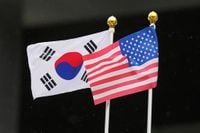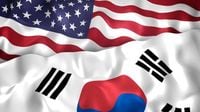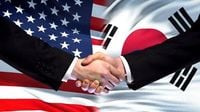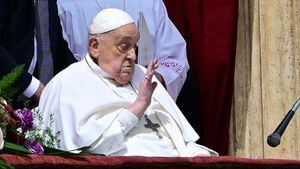South Korea and the United States are set to engage in critical trade discussions this week in Washington, amid rising global economic tensions stemming from ongoing trade disputes. The consultations, scheduled for April 20, 2025, follow an invitation from the U.S. and will involve high-level officials from both nations, including South Korean Finance Minister Choo Kyung-ho and Trade Minister Ahn Duk-geun, alongside U.S. Trade Representative Jamieson Greer and Undersecretary of Treasury Scott Besant.
In a statement released by the South Korean Ministry of Trade, the meeting is seen as an opportunity to address the trade restrictions imposed by former U.S. President Donald Trump, specifically the 25% tariffs on South Korean imports. Although these tariffs have been temporarily suspended, South Korea aims to negotiate their permanent reduction.
This diplomatic effort comes at a time when South Korea is grappling with a sluggish economy, exacerbated by the effects of international trade competition. The South Korean government recently announced a supplementary budget of 12.2 trillion won (approximately $8.6 billion) to bolster its economy, which heavily relies on exports. This budget includes allocations of 2.1 trillion won for trade-related projects, 1.8 trillion won for developing advanced industries, 4.3 trillion won to support small businesses, and 3.2 trillion won for disaster preparedness following severe wildfires.
"We hope to reach an agreement to reduce the reciprocal tariffs imposed by the U.S., which have significantly impacted our trade balance," said a spokesperson from the Ministry of Trade. The urgency of these discussions is underscored by the recent economic indicators, which suggest that South Korea's economy may have contracted in the first quarter of 2025, prompting the Bank of Korea to consider delaying interest rate cuts.
In an interview with the Financial Times, South Korean President Han Duck-soo expressed a firm stance against retaliating to U.S. tariffs, citing the historical support from Washington. He emphasized that the country would not retreat from its commitment to free trade and cooperation. "We will not respond to the tariffs imposed by the U.S., given our longstanding alliance and economic partnership," he stated.
These trade talks are particularly significant as they come ahead of South Korea's presidential elections scheduled for June 3, 2025. The political landscape remains tense, with the current government facing scrutiny from opposition parties that have called for a more substantial budgetary response to the economic challenges posed by U.S. trade policies.
Moreover, the South Korean government is navigating a complex political environment, as the opposition has demanded a larger supplementary budget of 35 trillion won to address the economic downturn. This has led to heightened tensions, with the previous administration's handling of budgetary issues resulting in a constitutional crisis that ended with the impeachment of former President Yoon Suk-yeol.
As the trade consultations approach, South Korea remains focused on balancing its economic growth with the need for fiscal stability. The additional budget is expected to increase the national debt to 3.2% of GDP, up from 2.8%, raising concerns about long-term fiscal sustainability. The government anticipates that the supplementary budget may only contribute to a 0.1 percentage point increase in economic growth.
The discussions this week are not only crucial for South Korea's immediate economic outlook but also for the broader implications of U.S.-South Korea relations in an increasingly protectionist global environment. The outcome of these talks could set the tone for future trade negotiations and cooperation between the two nations.
In summary, as South Korea prepares for these pivotal trade talks, the focus remains on reducing tariffs and fostering economic stability amidst rising global uncertainties. The outcome will be closely watched by analysts and policymakers alike, as it could have lasting effects on the economic landscape of both countries.






